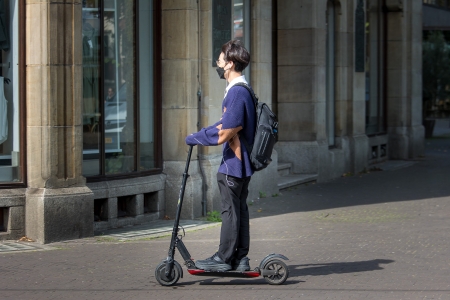LEVs that the Netherlands Vehicle Authority has designated as special mopeds can be used on public roads. See Table 2 for an overview of the vehicles that are presently allowed on Dutch roads [2]. Hoverboards, electric skateboards or monowheels are examples of vehicles not allowed on public roads or pavements. For now, the vast majority of electric scooters (e-scooters) are banned from Dutch public roads. Some LEVs covered by the ‘special moped’ rule may be authorised for use on public roads. For January 2023, a new LEV authorisation framework is expected
|
Trikke |
Segway |
Swing |
Zappy 3 |
|
|
|
|
|
|
Virto |
Paukool |
Ninebot type E |
LEF (voorheen E-one) |
|
|
|
|
|
|
Robin-M1 |
Virtos |
Kickbike Luxury |
Kickbike Cruise |
|
|
|
|
|
|
Ninebot type Urban |
Yedoo Mezec |
Kickbike Fat Max |
Qugo runner |
|
|
|
|
|
|
BSO-bus |
|
|
|
|
|
|
|
|
Current authorisation: special moped rule
A special moped is a light motor-driven vehicle that is not included in the moped category because of its specific characteristics (e.g. no saddle). They are therefore not covered by European moped legislation. The special mopeds are allowed on Dutch roads under the ‘special moped’ admittance rule [3]. These admittance rules are national rules and they may differ among European countries.
In short, a special moped is a vehicle that:
- is not already covered by a European regulation;
- has a maximum speed of 25 km/h;
- has a combustion engine with a maximum cylinder capacity of 50 cm3 or an electric motor with a maximum power of 4 kW.
Authorisation from 2023 onwards: LEV authorisation framework
The LEV authorisation framework, expected to take effect in January 2023, will replace the special moped rule (for a summary of the new authorisation framework, see: [1]). This authorisation framework will be introduced in response to an advisory report of the Dutch Safety Board [4] and because, as yet, there is no European framework for LEVs.
